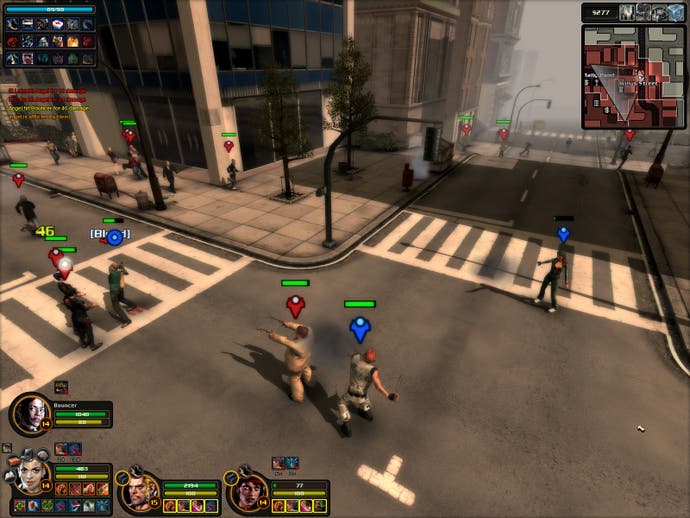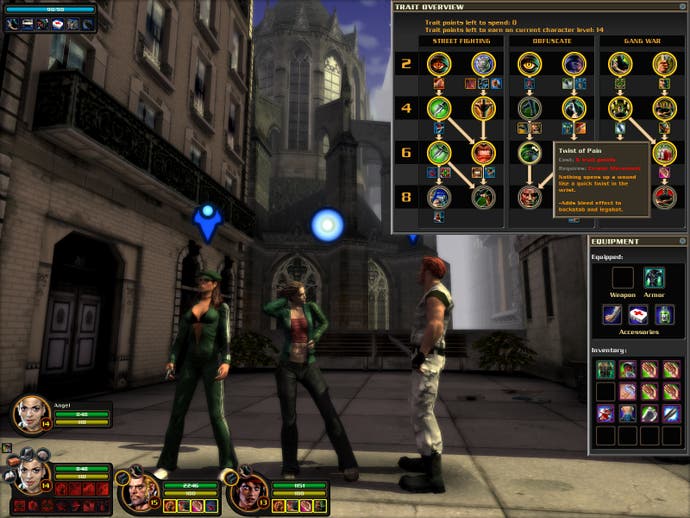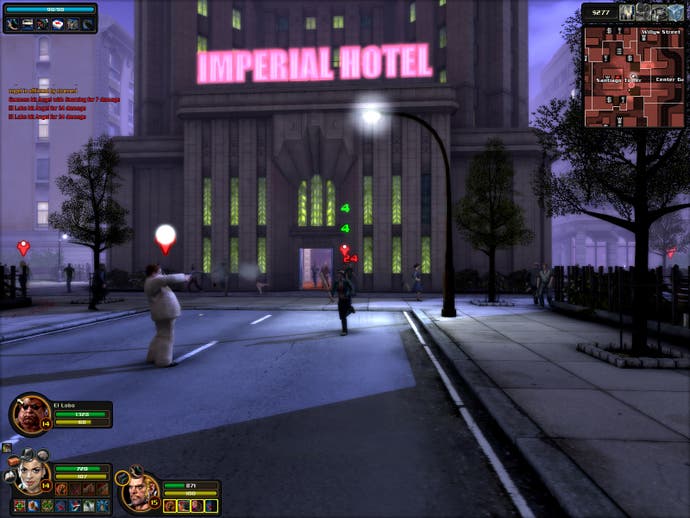Escape From Paradise City
Gangbland.
As will be endlessly discussed in a thousand Best Games of 2007 lists, Portal was more than the sum of its parts. It's just a puzzle game about jumping through holes, if you ask me. Of course, there's no question that Valve's baby could have ended up technically impressive yet emotionally bland in lesser hands. Instead, excellence in the form of a sharp, witty script and an inspired design aesthetic (collapsing brilliantly from order into chaos in parallel to the sanity of your nemesis) nailing it on the head perfectly.
You can probably tell this isn't going to end with a great score if I'm harping on about Portal before we even get started on the game I'm meant to be reviewing, can't you?
Anyway, what I wanted to get at is how easy it is to distil the essence of games down to rote mechanics - Portal is all about jumping through holes, Pokemon is about using big numbers to defeat small numbers, Virtua Fighter is pushing buttons at the right moment, and so on - and how that doesn't necessarily have to be a bad thing. Once you learn the techniques to win, and then translate those into an easily replicable formula of success, it can still be an excellent experience, as long as the game's smoke and mirrors are impressive enough not to shatter your immersion. The above examples attest to that. When you peek behind the glitz and see the bare bones structure there, sometimes, hey, that doesn't matter because the decoration's so brilliant, and other times, well, welcome to Paradise City. Excuse me while I now start on the meat of this review before valiantly tying all this up at the end somehow. Go me.
I guess they can't

Escape From Paradise City is the spiritual sequel to Gangland, an RTS/RPG hybrid mobster game from a few years back that passed most of us by like an X-Factor winner's career. This new game is set in the same city as the last title but expunges the Mafia connections for comic-book-style street brawls with a silly piece of sci-fi fluff stuck in its belly button. What starts out as an urban gangland story that wouldn't look out of place in any wannabe Grand Theft Auto clone mutates into vampire nonsense towards the end. It matters not: the plot's a watery soup and the supernatural element has absolutely no bearing at all on the main objective of the game. That is, to take control of each level's map by capturing various neighbourhoods one-by-one in a manner slightly reminiscent of the gang fighting feature found in San Andreas.
Like GTA, Paradise City is set in a detailed, bustling world, full of vehicles and pedestrians talking inanely and going about their business. But it contains nothing of GTA's humour or inventiveness. The gritty cartoonish graphics down at pedestrian level hold up to scrutiny, but you'll most likely spend your time zoomed out anyway. It's easier to look over the city in order to scope what's going on in battles than in amongst the fracas with its fiddly direct control. There's also no real diversion from map to map: buildings and objects get recycled frequently, pieced together with little imagination, and each level looks remarkably like the others.
Over the duration of sixteen levels, you're forced into the blood-splattered shoes of three different characters initially hired by the government to do their dirty work: bearded lothario Porter favours big guns; the fat, swarthy Ukranian Boris uses smaller firearms; and sassy Latino brawler Angel something blunt or sharp. Trust me, though, there's really no discernible difference between them aside from the soundbites they spout. Killing enemies gains each character experience points to upgrade their stats, but an easily-reached cap per level limits how much you can manually advance, preventing you becoming too powerful too soon. In fairness, progress is satisfyingly constant during the game's short length, but it's difficult to see the effect of such upgrades when you're ultimately killing exactly the same sort of enemies at the higher levels as you did at level 1, only with a lot more hitpoints.
I guess they won't

As for the territorial battles, the main method of conquest is nothing more complex than making a beeline to the each area's gang HQ, offering its defenders a tasty bullet soufflé, then wearing down their boss until his health bar says he's ready to relinquish his hood over to you. Do so and you automatically start to earn money from that area's business ventures as well as trait points to spend on upgrading your character's skills.
Earn enough points and this eventually gives you the right to a henchman or two to watch your back (apart from Boris who starts with one off the bat). They're an essential part of combat, and also infuriating to boot. For starters, they have no sense of self-preservation, and constantly require your direct intervention to stop them fighting themselves into an early grave. They also have a tendency to dumbly chase a sole wounded enemy right into a large group of his friends and bring them all back to kill you. Stupid henchmen. That sort of thing doesn't go down at all well in the middle of a hectic gun battle. On a slightly more positive note, though, your group's pathfinding skills are pretty good (on maps made of angular streets and alleys, mind). You also heal automatically and quickly whenever you're not in combat instead of mucking about with medkits.
I guess they front
Initially, my henchmen's boneheaded AI seemed to be the death of both me and progress. Numerous reloads later and I found out why: I was thinking too tactically. There's really only one way to win in this game, and once you discover it, the game ceases being an entertaining package and becomes a determined slog to the finish.

But let me explain. One of the other bonuses for taking over a district is Power, which is used to activate the special skills that aid your character (yes, there are a lot of pointless things to upgrade). The problem is that when you earn those skills, it's far too easy to spam them over and over again to win. Using each costs points and money, but the bar fills up relatively quickly and once you take over the lesser-guarded districts at the start of a map, you're pretty much sorted to take out anybody around your character's current skill level, which, due to the stunted XP cap, is almost everyone. My personal method of success was to select the NPC mob skill and a medic, then go all-in for the attack. It's then a matter of who's got the biggest numbers. All tactics go out the window to be replaced with a Zerging strategy at the most basic level. The enemy resorts to running at you then running away when near death. Fighting is reduced to pointing and clicking in the general area and standing back until the dust has cleared. Sometimes you don't even have to be there yourself: just click on your minions and forget about it.
And here, specifically, is where the curtain falls away and you see the same old rusty techniques behind. It's all about the tank rush, sometimes an enjoyable tactic (well, it was back when we were playing Dune 2), but one the game never really gets round to subverting. When it's all that's left for you to do in the increasingly repetitive levels, you can't help feeling a little cheated. What look like promising management options never come to fruition, and the ability to hire dedicated gang members, as outlined by the game early on, is redundant. Ultimately, it falls flat.
Coming full circle, then, Portal was a game about jumping through holes; more than the sum of its parts. Escape From Paradise City is game about tank rushing. Its fundamentals are sussed pretty quickly, but that veneer of a polished plot or inventive level design is lacking. It scores a little better than it should for a decent interface and obligatory multiplayer mode, but it won't be this game that steals our hearts and makes us prattle on endlessly about it.







